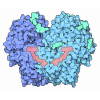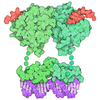+ Open data
Open data
- Basic information
Basic information
| Entry | Database: PDB / ID: 8trh | ||||||
|---|---|---|---|---|---|---|---|
| Title | The IDRc bound human core Mediator complex | ||||||
 Components Components |
| ||||||
 Keywords Keywords | TRANSCRIPTION / Mediator. | ||||||
| Function / homology |  Function and homology information Function and homology informationpositive regulation of T cell extravasation / CKM complex / negative regulation of smooth muscle cell differentiation / enucleate erythrocyte development / positive regulation of type II interferon-mediated signaling pathway / regulation of RNA biosynthetic process / androgen biosynthetic process / positive regulation of G0 to G1 transition / retinal pigment epithelium development / G0 to G1 transition ...positive regulation of T cell extravasation / CKM complex / negative regulation of smooth muscle cell differentiation / enucleate erythrocyte development / positive regulation of type II interferon-mediated signaling pathway / regulation of RNA biosynthetic process / androgen biosynthetic process / positive regulation of G0 to G1 transition / retinal pigment epithelium development / G0 to G1 transition / thyroid hormone receptor signaling pathway / mammary gland branching involved in thelarche / core mediator complex / regulation of vitamin D receptor signaling pathway / nuclear retinoic acid receptor binding / positive regulation of hepatocyte proliferation / ventricular trabecula myocardium morphogenesis / positive regulation of keratinocyte differentiation / mediator complex / thyroid hormone generation / Generic Transcription Pathway / : / peroxisome proliferator activated receptor binding / embryonic heart tube development / cellular response to thyroid hormone stimulus / nuclear vitamin D receptor binding / embryonic hindlimb morphogenesis / lens development in camera-type eye / nuclear thyroid hormone receptor binding / embryonic hemopoiesis / triglyceride homeostasis / megakaryocyte development / cellular response to hepatocyte growth factor stimulus / cellular response to steroid hormone stimulus / positive regulation of intracellular estrogen receptor signaling pathway / limb development / epithelial cell proliferation involved in mammary gland duct elongation / cortical actin cytoskeleton / negative regulation of neuron differentiation / histone acetyltransferase binding / LBD domain binding / RSV-host interactions / mammary gland branching involved in pregnancy / general transcription initiation factor binding / skeletal muscle cell differentiation / somatic stem cell population maintenance / animal organ regeneration / monocyte differentiation / blastocyst development / negative regulation of keratinocyte proliferation / hematopoietic stem cell differentiation / positive regulation of transcription initiation by RNA polymerase II / nuclear receptor-mediated steroid hormone signaling pathway / ubiquitin ligase complex / embryonic placenta development / fat cell differentiation / RNA polymerase II preinitiation complex assembly / erythrocyte development / negative regulation of fibroblast proliferation / keratinocyte differentiation / : / lactation / Regulation of lipid metabolism by PPARalpha / peroxisome proliferator activated receptor signaling pathway / BMAL1:CLOCK,NPAS2 activates circadian expression / Activation of gene expression by SREBF (SREBP) / positive regulation of erythrocyte differentiation / cholesterol homeostasis / cellular response to epidermal growth factor stimulus / nuclear estrogen receptor binding / nuclear receptor binding / transcription coregulator activity / transcription initiation at RNA polymerase II promoter / promoter-specific chromatin binding / positive regulation of transcription elongation by RNA polymerase II / Heme signaling / liver development / PPARA activates gene expression / Transcriptional activation of mitochondrial biogenesis / Cytoprotection by HMOX1 / protein-DNA complex / chromatin DNA binding / brain development / Nuclear Receptor transcription pathway / Transcriptional regulation of white adipocyte differentiation / mRNA transcription by RNA polymerase II / transcription coactivator binding / cell morphogenesis / protein import into nucleus / DNA-directed RNA polymerase activity / ubiquitin protein ligase activity / transcription corepressor activity / actin binding / MLL4 and MLL3 complexes regulate expression of PPARG target genes in adipogenesis and hepatic steatosis / angiogenesis / transcription regulator complex / Estrogen-dependent gene expression / DNA-binding transcription factor binding / transcription by RNA polymerase II / transcription coactivator activity Similarity search - Function | ||||||
| Biological species |  Homo sapiens (human) Homo sapiens (human) | ||||||
| Method | ELECTRON MICROSCOPY / single particle reconstruction / cryo EM / Resolution: 3.7 Å | ||||||
 Authors Authors | Chen, S.F. / Chao, T.C. / Kim, H.J. / Tang, H.C. / Khadka, S. / Li, T. / Murakami, K. / Boyer, T.G. / Tsai, K.L. | ||||||
| Funding support |  United States, 1items United States, 1items
| ||||||
 Citation Citation |  Journal: Mol Cell / Year: 2024 Journal: Mol Cell / Year: 2024Title: Structural basis of the human transcriptional Mediator regulated by its dissociable kinase module. Authors: Ti-Chun Chao / Shin-Fu Chen / Hee Jong Kim / Hui-Chi Tang / Hsiang-Ching Tseng / An Xu / Leon Palao / Subash Khadka / Tao Li / Mo-Fan Huang / Dung-Fang Lee / Kenji Murakami / Thomas G Boyer / Kuang-Lei Tsai /  Abstract: The eukaryotic transcriptional Mediator comprises a large core (cMED) and a dissociable CDK8 kinase module (CKM). cMED recruits RNA polymerase II (RNA Pol II) and promotes pre-initiation complex ...The eukaryotic transcriptional Mediator comprises a large core (cMED) and a dissociable CDK8 kinase module (CKM). cMED recruits RNA polymerase II (RNA Pol II) and promotes pre-initiation complex formation in a manner repressed by the CKM through mechanisms presently unknown. Herein, we report cryoelectron microscopy structures of the complete human Mediator and its CKM. The CKM binds to multiple regions on cMED through both MED12 and MED13, including a large intrinsically disordered region (IDR) in the latter. MED12 and MED13 together anchor the CKM to the cMED hook, positioning CDK8 downstream and proximal to the transcription start site. Notably, the MED13 IDR obstructs the recruitment of RNA Pol II/MED26 onto cMED by direct occlusion of their respective binding sites, leading to functional repression of cMED-dependent transcription. Combined with biochemical and functional analyses, these structures provide a conserved mechanistic framework to explain the basis for CKM-mediated repression of cMED function. | ||||||
| History |
|
- Structure visualization
Structure visualization
| Structure viewer | Molecule:  Molmil Molmil Jmol/JSmol Jmol/JSmol |
|---|
- Downloads & links
Downloads & links
- Download
Download
| PDBx/mmCIF format |  8trh.cif.gz 8trh.cif.gz | 1.4 MB | Display |  PDBx/mmCIF format PDBx/mmCIF format |
|---|---|---|---|---|
| PDB format |  pdb8trh.ent.gz pdb8trh.ent.gz | 1.1 MB | Display |  PDB format PDB format |
| PDBx/mmJSON format |  8trh.json.gz 8trh.json.gz | Tree view |  PDBx/mmJSON format PDBx/mmJSON format | |
| Others |  Other downloads Other downloads |
-Validation report
| Arichive directory |  https://data.pdbj.org/pub/pdb/validation_reports/tr/8trh https://data.pdbj.org/pub/pdb/validation_reports/tr/8trh ftp://data.pdbj.org/pub/pdb/validation_reports/tr/8trh ftp://data.pdbj.org/pub/pdb/validation_reports/tr/8trh | HTTPS FTP |
|---|
-Related structure data
| Related structure data |  41580MC  8tq2C  8tqcC  8tqwC M: map data used to model this data C: citing same article ( |
|---|---|
| Similar structure data | Similarity search - Function & homology  F&H Search F&H Search |
- Links
Links
- Assembly
Assembly
| Deposited unit | 
|
|---|---|
| 1 |
|
- Components
Components
+Mediator of RNA polymerase II transcription subunit ... , 25 types, 25 molecules 01234ADFGHIJKNOPQRTVWXdSU
-Protein/peptide / Non-polymers , 2 types, 3 molecules B

| #27: Chemical | | #7: Protein/peptide | | Mass: 1720.111 Da / Num. of mol.: 1 / Source method: isolated from a natural source / Source: (natural)  Homo sapiens (human) Homo sapiens (human) |
|---|
-Details
| Has ligand of interest | Y |
|---|---|
| Has protein modification | N |
-Experimental details
-Experiment
| Experiment | Method: ELECTRON MICROSCOPY |
|---|---|
| EM experiment | Aggregation state: PARTICLE / 3D reconstruction method: single particle reconstruction |
- Sample preparation
Sample preparation
| Component | Name: The IDRc bound human core Mediator complex / Type: COMPLEX / Entity ID: #1-#26 / Source: NATURAL |
|---|---|
| Source (natural) | Organism:  Homo sapiens (human) Homo sapiens (human) |
| Buffer solution | pH: 7.9 |
| Specimen | Embedding applied: NO / Shadowing applied: NO / Staining applied: NO / Vitrification applied: YES |
| Vitrification | Instrument: FEI VITROBOT MARK III / Cryogen name: ETHANE / Humidity: 100 % |
- Electron microscopy imaging
Electron microscopy imaging
| Experimental equipment |  Model: Titan Krios / Image courtesy: FEI Company |
|---|---|
| Microscopy | Model: TFS KRIOS |
| Electron gun | Electron source:  FIELD EMISSION GUN / Accelerating voltage: 300 kV / Illumination mode: FLOOD BEAM FIELD EMISSION GUN / Accelerating voltage: 300 kV / Illumination mode: FLOOD BEAM |
| Electron lens | Mode: BRIGHT FIELD / Nominal defocus max: 2800 nm / Nominal defocus min: 600 nm |
| Image recording | Electron dose: 52 e/Å2 / Film or detector model: GATAN K2 QUANTUM (4k x 4k) |
- Processing
Processing
| CTF correction | Type: PHASE FLIPPING AND AMPLITUDE CORRECTION |
|---|---|
| 3D reconstruction | Resolution: 3.7 Å / Resolution method: FSC 0.143 CUT-OFF / Num. of particles: 97904 / Symmetry type: POINT |
 Movie
Movie Controller
Controller











 PDBj
PDBj




